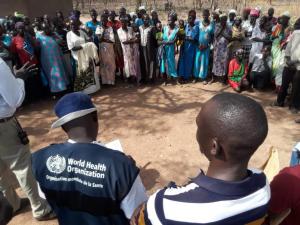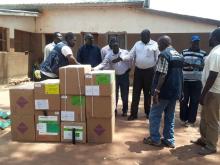WHO and partners assess and respond to the health needs of over 5000 internally displaced population in Dulamaya, South Sudan
18 March 2019, Juba – The World Health Organization and partners conducted a joint inter-cluster needs assessment mission in Dulamaya, Rokon town, South Sudan to address the health needs of over 5000 internally displaced people.
To address these needs, the World Health Organization delivered a range of lifesaving kits to Dulamaya. The kits are part of the inter-cluster response to an estimated population of 5000 inhabitants displaced from Minga payam in Mundri East County, Amadi Sate. The much-needed drugs were delivered with funding from the South Sudan Humanitarian Fund (SSHF). Additionally, HealthLink South Sudan a national NGO provided 250 long lasting insecticides treated nets (LLITNs) to the most vulnerable members of the IDPs especially children under five, pregnant women and lactating mothers.
The lifesaving health kits that WHO provided are part of the joint inter cluster response to an estimated 800 households, says Dr Olushayo Olu, WHO Country Representative for South Sudan; noting that the delivery of the much-needed medical supplies saves the lives of people in critical humanitarian settings.
Following reports presented to UNOCHA of fresh displacements of over 5000 people arising from fierce fighting in Minga payam of Amadi State, a multi-cluster team of 41 members from different organizations and UN agencies representing various clusters including WHO, OCHA, Healthlink South Sudan, UNHCR, ART, MacDA, PAH, and RRC conducted a three days mission to access the situation. The mission was aimed at obtaining an overview of the health situation of the IDPs by identifying the immediate health needs and gaps to inform the scale of the emergency response.
In terms of health, the mission findings revealed that there is limited access to health care services with the nearest functional health facility located 18 miles away from the IDP site. The IDPs reported that there is a high prevalence of communicable diseases such as malaria, respiratory tract infections, diarrhea (both watery and bloody diarrhea), especially among children and adults. Eye infections, nodding syndrome/epilepsy, and skin diseases/infections are also common. One of the IDP revealed that he was living with HIV; additionally, a young girl of 17 years died after a snake bite.
In the absence of basic medical services, there is a high dependence on herbal medicine for treating malaria, eye infections, diarrhea/worm infections, general body pains and fever. However, the population continue to have trust in health services as clearly reported by some of the IDPs interviewed: “herbs are not so effective like the medications that are obtained from the hospitals/health facilities.”
As a follow up, the Health cluster through the cluster partner HealthLink South Sudan committed to conduct integrated medical mobile services among the IDPs including Immunization services.
Tel: +211955016121
Email: louisju [at] who.int (louisju[at]who[dot]int)
Medical Mobile Team/WHE
Email: odraw [at] who.int (odraw[at]who[dot]int)
Telephone: +211 929 246 505
Tel : +211923362401
Email: wamalaj [at] who.int (wamalaj[at]who[dot]int)




